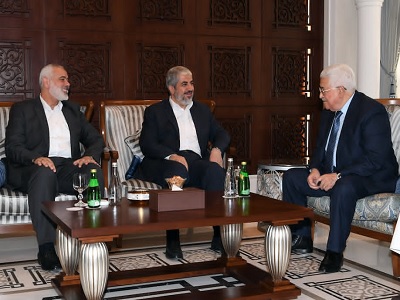
Following reconciliation negotiations in Moscow and reports that Fatah and Hamas came to agreements regarding the formation of a unity government, members of the Fatah movement have expressed that divisions between Palestinian political factions “should end in a short time.”
Member of Fatah’s central committee, Azzam al-Ahmad, said in a statement Thursday that “ending division is key to renewing different Palestinian institutions” and that the three-day meetings in Moscow confirmed Russia’s “concern for the Palestinian cause and uniting the Palestinian lines.”
Al-Ahmad highlighted that “the task of a national unity government is to supervise re-electing institutions of the Palestinian Authority (PA) and helping the central elections committee carry out general elections.”
Fatah and Hamas to form unity government, paving way for formation of new Palestinian National Council – officials https://t.co/PB7E3dhUAB pic.twitter.com/7nISDTV3TU
— Al Jazeera News (@AJENews) January 18, 2017
He added that “everyone would head to President Mahmoud Abbas to start negotiations on forming a national unity government and remove obstacles that came in the way as the president, according to the law, is the one responsible for negotiations on forming the government.”
Al-Ahmad called upon all Palestinian factions to “put in all they could” to facilitate forming a government that “depends on the Palestinian Liberation Organization’s agenda as the agreed-upon minimum between all Palestinian factions.”
The Times of Israel reported that after the proposed unity government is formed — which includes the Islamic Jihad party as well as Fatah and Hamas — the Palestinians would set up a national council, including Palestinians in exile.
This is exactly what Palestinian people need #cohesion Hamas & Fatah reached agreement on national unity governmenthttps://t.co/0HiBCKZid3
— MEP Martina Anderson (@M_AndersonSF) January 18, 2017
Tensions between Hamas and the PA have risen in recent weeks, with each side accusing the other of carrying out “politically motivated” arrests, and blaming each other for an ongoing electricity crisis in the Gaza Strip which left the majority of Palestinians there with only three hours of power a day for more than a week.
Fatah and Hamas have been embroiled in conflict since Hamas’ election victory in 2006 elections in the Gaza Strip, which erupted into a violent conflict between the two movements as both attempted to consolidate control over the territory.
Despite numerous attempts at reconciling the groups, Palestinian leadership has so far repeatedly failed to follow through on promises of reconciliation and holding of long-overdue elections, as both movements have frequently blamed each other for numerous political failures.
https://twitter.com/nkulw/status/821566986073280512
Officials from the Fatah-led PA have criticized Hamas for creating a shadow government in the Gaza Strip and blocking efforts to reach political unity.
Hamas has in turn accused the PA of executing a plan to “eradicate” the movement from the West Bank, accusing Fatah of “escalating security collaboration” with the Israeli authorities through politically-motivated arrests and “adopting a revolving door policy” funneling Palestinians from PA jails into Israeli prisons.
(Ma’an, PC, Social Media)




